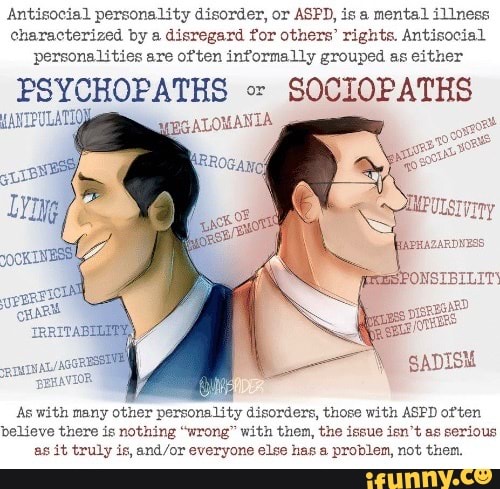

Thanks to tools like the PCL-R, instead of wasting limited resources on a few bad apples, the justice system can focus those resources on the majority of offenders - those who can profit from a second chance and are, more often than not, motivated to change.

Although modern psychopathy is more nuanced than its 19th century ancestor, diagnosing it remains an essentially subjective task. Circular in its reasoning, psychopathy is nonetheless alluring in its simplicity. The psychopath is irredeemable, a dangerous outsider who must be contained or banished. We need not reach out a hand to help him along a pathway to redemption.

We need not understand a criminal's troubled past or environmental influences. By foregrounding intrinsic evil, psychopathy marginalizes social problems and excuses institutional failures at rehabilitation.Here are some selections (all direct quotes): Thankfully, NPR also linked to a few other experts weighing in on the PCL-R. I do find it odd that he personally wields so much power with regard to the subject matter - if you haven't studied with him, if you don't use his test, you're basically nobody in some people's eyes - which gets back to my point about the cult of experts. I don't mean to criticize him as a person, and I do believe that his work is remarkably insightful and accurate given that it still represents the very early stages of understanding psychopathy. Robert Hare in a pretty good light, as a pioneer in shining more light on a highly misunderstood disorder. So although the test proved "astonishingly" reliable, whatever that means, it does not mean at all that it is valid. No magic, no revelation from God, no genetic or brain scan research validating each personality trait either, and, as mentioned many times before, the PCL-R was based exclusively on his work with psychopaths that he had identified in prison using what he believed were psychopathic traits based on his work with psychopathic prisoners that he had identified using what he believed were psychopathic based on his work with psychopathic prisoners. In research settings, the PCL-R's reliability appeared astonishingly good. Hare next tested his test to make sure that it was "scientifically reliable" - that two people using the test on the same person would reach the same conclusion about whether that person was a psychopath. Scores were totaled at the end - 40 was the highest score, but anything over 30 certified the test taker as a psychopath. The test listed 20 traits to check, and so Hare called it the Psychopath Checklist. If it was there, the prisoner got 2 points if it wasn't, zero if the psychologist couldn't tell, 1 point was awarded.
#SOCIOPATH CHECKLIST SERIES#
Psychologists using the test were supposed to ask the prisoners a series of questions to determine whether the trait was present.

Things like lack of empathy, lack of remorse, manipulation, egocentricity, impulsivity, superficial charm, psychological lying.įor each of these qualities, Hare wrote up a description so it would be clear what he meant by, say, lack of empathy. Hare sat down with his research assistant and together they wrote down all the personality traits they'd consistently seen in the psychopaths they'd studied. "The key is measurement, simple as that."Īnd so Hare decided to make a way to measure: a test for psychopaths. "Science cannot progress without reliable and accurate measurement of what it is you are trying to study," says. The most personally interesting part was the simple explanation of the origins of the original PCL: This time the focus is on the plight of a criminal who gets diagnosed a psychopath and then is denied parole on the basis of that diagnosis, as well as the legitimacy of a three hour test that basically determines your personality/predispositions/fate - the PCL-R. It must be psychopath week at NPR, because a reader sent me yet another article on psychopaths.


 0 kommentar(er)
0 kommentar(er)
